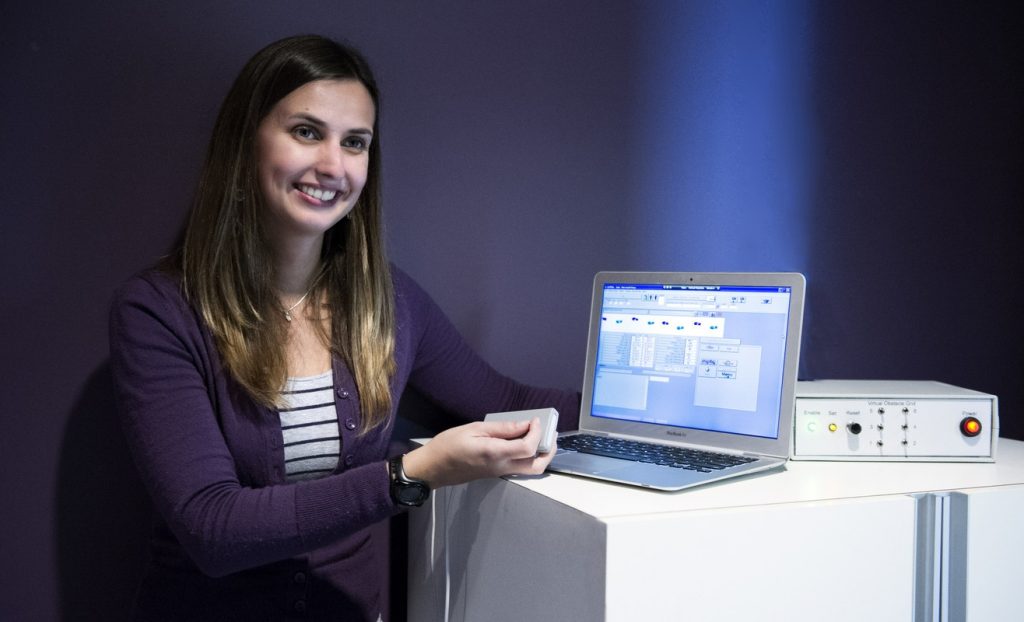Negotiating unexpected obstacles, such as cracks in pavement, requires successful adaptation of our walking pattern to guarantee stability and to avoid falling. Poor walking performance might contribute to tripping, which is frequently reported as a cause of falls in older people (Lord et al. 1993).
We have devised a test that is able to assess an individual’s ability to adapt to environmental hazards while walking (Caetano et al. 2016). The test has been designed to mimic some of the cognitive demands required for walking in daily life. It requires people to either step onto a target or avoid an obstacle while walking on a pathway in the laboratory.
In a recent experiment, we used this test to determine whether impaired walking adaptability is associated with cognitive and sensorimotor function in older adults (Caetano et al. In Press). Fifty healthy older adults completed the walking adaptability test, as well as assessments of cognitive and sensorimotor function. The cognitive assessments included the Trail Making Test and the Stroop Test. The Trail Making Test measures cognitive flexibility of executive function, and the Stroop Test measures inhibitory control of executive function. The sensorimotor tests measured balance, leg strength, reaction time, proprioception, and visual contrast sensitivity.
WHAT DID WE FIND?
We found that poorer cognitive and sensorimotor performances were associated with a reduced ability to adjust walking performance. Specifically, reaction time and performance on the Stroop Test discriminated between older adults who did and did not make errors in the walking test. Slower reaction time also predicted poorer stepping accuracy. Poor balance, weaker leg strength and poorer cognitive performances predicted increased number of steps taken to approach the target/obstacle and shorter step length.
SIGNIFICANCE AND IMPLICATIONS
Our study found that superior executive function and fast processing speed were important for planning and adjusting stepping in a walking task that required rapid adjustments. Good balance and muscle strength were also important.
Our findings also demonstrate the importance of considering the context under which walking performance is assessed. A complex interplay of sensorimotor and cognitive abilities are likely required for older people to meet everyday challenges associated with walking, such as crossing streets, moving in crowds, etc. Thus, the walking adaptability test provides a novel way to explore sensorimotor and cognitive mechanisms involved in complex walking tasks.
Further, our findings may contribute to the development of new strategies for improving adaptive walking performance in older adults. These new strategies might involve adding decision-making tasks (e.g., obstacle avoidance) to walking adaptability training. However, additional studies are needed to determine whether our test paradigm can predict future falls, and whether walking adaptability training can prevent future falls.
PUBLICATION
Caetano MJD, Menant JC, Schoene D, Pelicioni PHS, Sturnieks DL, Lord SR. Sensorimotor and cognitive predictors of impaired gait adaptability in older people. J Gerontol A Biol Sci Med Sci, In Press.
If you cannot access the paper, please click here to request a copy.
KEY REFERENCES
Caetano MJD, Lord SR, Schoene D, Pelicioni PHS, Sturnieks DL, Menant JC. Age-related changes in gait adaptability in response to unpredictable obstacles and stepping targets. Gait Posture 46: 35-41, 2016.
Lord SR, Ward JA, Williams P, Anstey KJ. An epidemiological study of falls in older community-dwelling women: the Randwick falls and fractures study. Aust J Public Health 17: 240-245, 1993.
AUTHOR BIO

Maria Joana Duarte Caetano is a PhD candidate at the University of New South Wales, in association with the Falls, Balance and Injury Research Centre at Neuroscience Research Australia. Joana’s research aims to understand how older people adapt their gait in challenging environments and how cognitive-motor factors are associated with gait adaptability. Further, she investigates the effectiveness of videogame step training on gait adaptability in people with Parkinson’s disease. Joana’s doctoral work has been supported by the Brazilian National Council for Scientific and Technological Development. You can learn more about Joana’s research here.


Did you also assess the individuals capacity for generating adequate IAP with normal breathing during the gait cycle ?
Hi Inger,
Thank you for your question.
No, we did not measure IAP. This study focused on balance measurements only.
If you want to know more about our research lab, check this link out: https://www.neura.edu.au/research-centre/falls-balance-injury/
Regards,
Joana